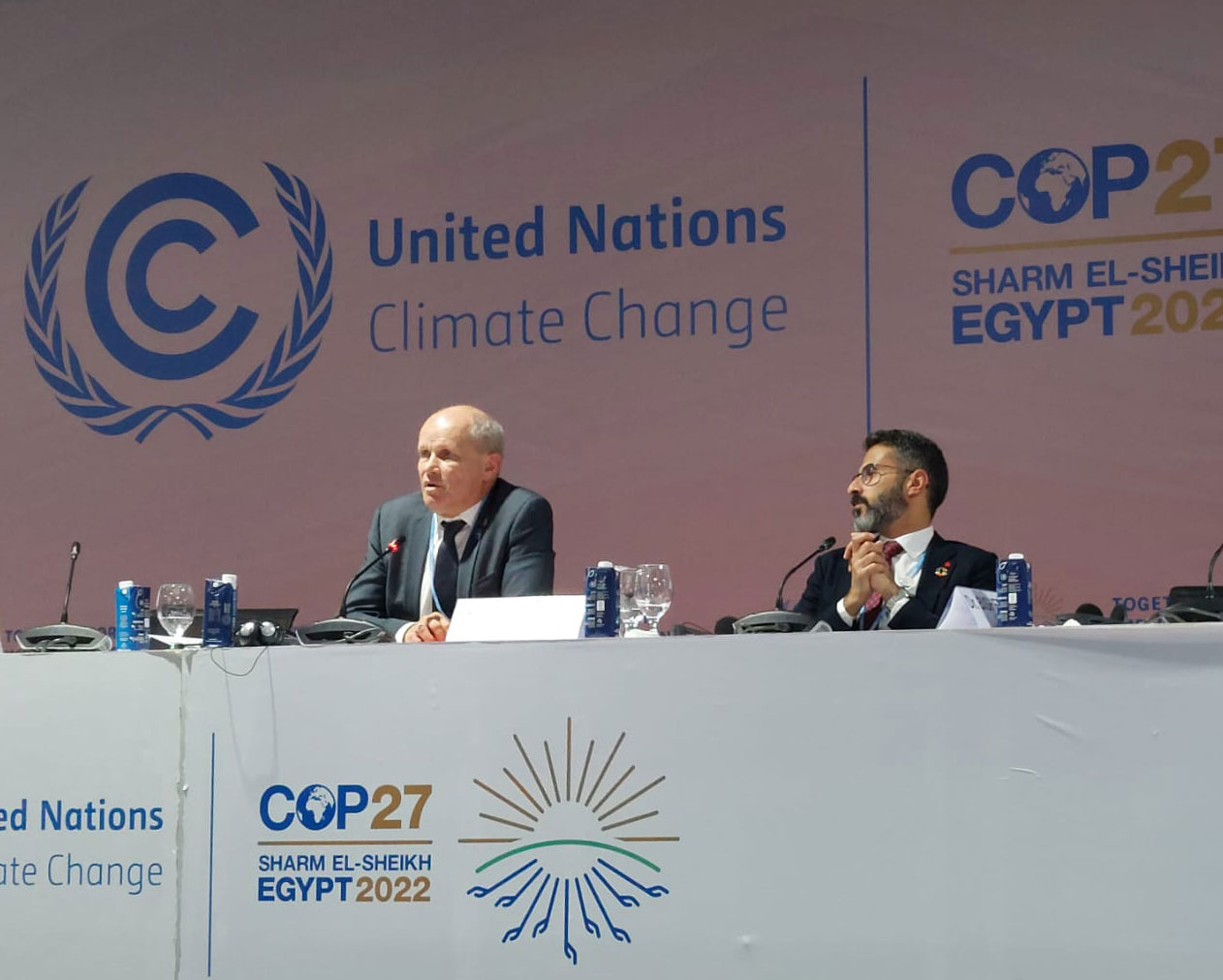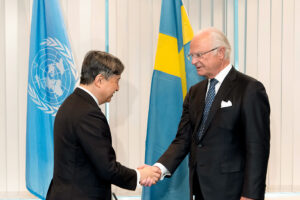What to look for in the second week of COP27
14 November is the first-ever official Water Day at the climate conference COP, with SIWI’s Executive Director Torgny Holmgren speaking in the official programme. The day is just one sign of how water is rapidly moving up the global climate agenda. Here is your guide to both Water Day and the rest of the COP27 meeting.
Summarizing the first week of COP27, it is noticeable that water is featuring more prominently than ever. This year’s focus on implementation and adaptation are important drivers, as well as new research showing the crucial role of water for climate mitigation. Compared to when the Paris Agreement was written back in 2015, we now have a much clearer and more nuanced view on water and climate.
In response to this, the Egyptian COP presidency has declared that water should be front and centre of its agenda, including with a special Water Day in the official programme. The first week of the conference has however offered few surprises and only a limited number of commitments. Heading into its second week, negotiations are shifting into a higher gear and more initiatives can be expected.
If you are interested in water, here are a few things to keep an eye on:
Water Day – water, water everywhere…
Having the second week start with a Water Day on 14 November is welcome since it clearly demonstrates what is at stake, but also how water can offer a new kind of solutions.
Alongside heads of governments and UN agencies, Torgny Holmgren will speak in the official programme, emphasizing the role of smallholder farmers as front line water managers.
Later the same day, SIWI’s Ruth Mathews will talking about how to address water security and climate resilience in fragile contexts in an event organized by the ICRC and Malin Lundberg-Ingemarsson is joining a broadcast from We Don’t Have Time about water and gender.
SIWI is also one of the organizers of The power of water: the unexplored potential for climate resilience, which is part of the Marrakech Partnership on Global Climate Action. The event aims to show how water can contribute to tackling a broad range of climate-related issues, based on the Climate Action Pathway for Water.
Water is critical to both adaptation and financing since the impacts of climate change are mainly felt in the form of too much or too little water, for example as floods or droughts.
Climate Adaptation Agenda
COP27 has set out to focus more on adaptation to climate change, which seldom attracted much attention in previous climate talks. But with disastrous events such as the flooding in Pakistan and drought in Eastern Africa, the dramatic effects of global warming are now looming large over any climate conversation.
The Egyptian presidency launched the Sharm El-Sheikh Adaptation Agenda on 8 November, to enhance the resilience of the 4 billion people living in the most climate vulnerable communities by 2030. The key phrase here is “locally-led” adaptation but it remains to be seen how the topic of adaptation will feed into the negotiations, discussions about financing and the future climate plans of countries, cities, and companies as well international institutions.
Negotiations
Two perspectives are at the centre of negotiations at COP27 – the need to speed up greenhouse gas reductions and the need to increase climate justice. At COP26, the two ended up being seen as competing, with some low-income countries trying to block reduction proposals and stronger wording on the phasing out of fossil fuels unless high-income countries delivered on their financial commitments. But the positions are less clear at COP27, with fewer statements and no official draft papers circulated yet.
The topic of loss and damage is however unavoidably at the heart of negotiations. It is clear how the financing promised so far pales in comparison to the toll of disasters like in Pakistan but also to assessments of future needs. If COP27 would be able to untangle the contentious issues of financing and compensation, it would be remembered as one of the most significant climate meetings in history, but the challenge is huge as most richer countries remain firmly opposed to the loss and damage concept.
Water is critical to both adaptation and financing since the impacts of climate change are mainly felt in the form of too much or too little water, for example as floods or droughts.
“We will present our first findings at the UN 2023 Conference, showing how water must be integrated across the SDGs, climate and biodiversity, but also how it is a central question for development.”
New role for water in climate action
The trends listed here all demonstrate that the narrative about water and climate is now rapidly shifting, with a better understanding of the role of nature and landscapes – land, freshwater and oceans. Already in Glasgow last year, this perspective began to feature more prominently and there is now a strong push from for example the Water Pavilion, with SIWI as an implementing partner, to ensure that this is reflected also in the outcomes of COP27.
The message is also brought forward to the upcoming UN Biodiversity Conference and the UN 2023 Water Conference. A real changemaker will likely be the forthcoming report from the Global Commission on the Economics of Water, which held its first press briefing in the Water Pavilion on the morning of 14 November. “We will present our first findings at the UN 2023 Conference, showing how water must be integrated across the SDGs, climate and biodiversity, but also how it is a central question for development,” said lead expert Aromar Revi.
SIWI in Water Day events
The power of water: the unexplored potential for climate resilience 10.00-11.30 EET Marrakech Partnership for Global Climate Action Room
Official Water Day event: Green Water and Water Resources Management 10.45-12.00 EET Speaker: Torgny Holmgren
Water Vulnerability of Communities Living in Fragile Contexts: Adaptation Barriers and Avenues for Improvement 12.00-13.00 EET Speaker: Ruth Mathews Egypt Pavilion
Water sector policies and institutions for effective climate adaptation and resilience 13.00-14.00 EET Speaker: Torgny Holmgren World Bank Pavilion
We Don’t Have Time: Water & gender 16.30-17.00 EET (15.30-16.00 EET) Speaker: Malin Lundberg Ingemarsson – watch it here.
Join us
To share new knowledge about water and climate, SIWI will be taking active part in the global climate conference COP27 between 6 and 18 November. Join our programme online to learn about a promising new generation of climate solutions.
SIWI at COP27








